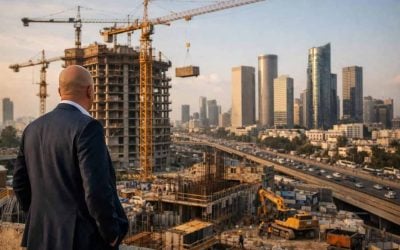Housing Market Trends & Prices
- Home Prices Still Climbing: Israel’s housing prices continued to rise through late 2024. The Central Bureau of Statistics reported a 0.6% increase in prices in the Sep–Nov 2024 period, contributing to an annual jump of about 7.8%. Despite a record number of new apartments coming on the market, demand remained strong – new-build units actually led the price gains. For example, Tel Aviv saw the highest monthly uptick (≈1.2% in one month), and Haifa led yearly growth at 11.7%. Rents have also been creeping up (roughly 4% higher for new tenants compared to previous ones).
- Mortgage Activity Fluctuates: January 2025 saw a sharp drop in new mortgage volume to ₪7.3 billion, 50% lower than December. This decline was expected because many buyers had rushed to close deals in Dec 2024 ahead of a VAT increase (from 17% to 18%) on new homes. In fact, December’s spike was unusual; January’s mortgages were actually 30% higher than January 2024 (and +15% vs Jan 2023). The share of mortgages via “buy now, pay later” developer deals fell to its lowest since April 2024, indicating a more cautious market.
- Affordability Concerns & Outlook: There are signs the market might be near a turning point due to affordability issues. A leading investment house economist predicts housing prices could finally ease in the coming year as more Israelis postpone buying. Meitav’s chief economist Alex Zabezhinsky noted that many families are now priced out – since 2021, only the top 30% of earners can qualify for an average mortgage, down from the top 50% a few years ago. He expects more households will opt to rent rather than buy, which could dampen demand and put downward pressure on prices. However, any cooling may be gradual, as pent-up domestic demand and investor interest still support the market for now.
Housing Price Trends
Mortgage Activity Comparison
Government Policy & Economic Factors
- Resilient Economy, Low Unemployment: Israel’s broader economy has held up better than expected. GDP grew about 1% in 2024 despite the Gaza war’s disruptions. Unemployment has even edged down – the jobless rate fell to 2.6% in January 2025 (seasonally adjusted), from 2.7% in Dec 2024. This ultra-low unemployment reflects a very tight labor market, which in turn supports housing demand (but also exacerbates construction labor shortages, as noted below).
- Monetary Policy – High Rates to Curb Inflation: The Bank of Israel is maintaining a tight monetary stance. It has kept its benchmark interest rate at 4.5% for many months in a row (as of the January 2025 meeting). Inflation (~3.2–3.5% in recent readings) is just above the target range, partly due to wartime pressures. The central bank signaled that rates could start to fall later in 2025 if inflation moderates into the 1–3% target band, but for now borrowing costs remain high. Expensive mortgages are one reason home-buying has cooled among locals, and the Bank noted that the pace of house price increases has begun to moderate under these conditions. (Notably, the slight rise in the Consumer Price Index last month included housing costs, keeping policymakers cautious).
- Tax Change: As mentioned, a 1% VAT hike on new home purchases took effect Jan 1, 2025, raising the tax from 17% to 18%. This policy change prompted a surge of transactions in late 2024, but going forward it marginally increases new-home prices. There were no other major new housing tax or subsidy programs announced as of mid-February, and officials appear to be relying on market forces (and post-war recovery) to eventually improve affordability.
Foreign Investment & Demand
- Surge in Diaspora Buyer Interest: Overseas investors and Jewish diaspora buyers are flocking to Israeli real estate in growing numbers. In the wake of the Hamas October 7, 2023 attacks and a rise in global antisemitism, many foreign Jews view owning property in Israel as a “safe haven” or insurance policy. Cities like Jerusalem, Tel Aviv, Herzliya, and Netanya are especially in demand among international buyers. Israeli banking officials report a sharp jump in foreign mortgage activity – the value of mortgages taken out by foreigners in late 2024 more than doubled (100%+ increase) compared to prior periods. One mortgage lender noted a 37% year-over-year rise in the number of home loans issued to non-residents in 2024. This marks a significant shift, with more foreigners now treating Israeli real estate not just as an investment but as a permanent relocation plan.
- Ongoing and Future Investment: Industry experts expect this international interest to remain strong or even grow in 2025. Banks are seeing steady transfers of funds from abroad for home purchases, and preparations for new mortgages by overseas clients are increasing. Foreign buyers also enjoy certain advantages – for instance, non-residents can finance up to ~50% of a purchase, and new immigrants (olim) can get up to 75% financing for a first home. Such incentives, combined with Israel’s reputation as a stable long-term investment market, position the country as a global real-estate hotspot despite high prices. Analysts say Israel is now “among the world’s most appealing destinations for international property investment,” given its robust demand and safe-haven appeal.
- Geopolitics and Investor Events: Political tensions are having some side-effects on real estate activities abroad. For example, an Israeli real estate investment event scheduled in New York was canceled at the last minute due to protests. The venue pulled out after pro-Palestinian groups planned demonstrations, illustrating how the Israel-Hamas conflict is spilling into the investment arena. Organizers are seeking an alternate location. While this doesn’t directly impact the housing market in Israel, it shows the charged atmosphere surrounding anything related to Israel – even real estate promotions. Nonetheless, on the ground in Israel, foreign individual investors continue to pursue opportunities, largely undeterred by political debates overseas.
Construction & Development Updates
- Post-War Construction Slowdown & Labor Shortage: The war’s outbreak in late 2023 significantly disrupted construction activity. Israel’s building sector relies heavily on Palestinian workers, tens of thousands of whom were barred from entering after Oct 7 for security reasons. This created an acute labor shortage just as rebuilding needs grew. In response, the government moved to import construction labor – thousands of workers from India have been invited to Israel to keep projects moving. This policy aims to fill the gap and prevent long delays in housing completions. Even so, developers have faced project slowdowns, and the Bank of Israel noted that “constraints on construction activity remain significant.”
- New Housing Supply Initiatives: Prior to the war, Israel was ramping up housing supply, and 2024 saw a record number of new apartments completed. Despite this record supply, it has not been enough to meet demand (as evidenced by continued price increases). The government is under pressure to accelerate construction once conditions stabilize. No major new construction incentive programs were announced as of mid-February, but the import of foreign labor and fast-tracking of permits are being used to boost building. Industry officials are hopeful that if labor issues are resolved, the pace of new housing starts will pick up later in 2025 to gradually ease the shortage.
- West Bank Settlement Expansion: In a controversial development, Israeli authorities advanced plans for nearly 1,000 new homes in the West Bank. A government tender was issued for 974 housing units in Efrat, a settlement south of Jerusalem. According to the watchdog group Peace Now, this expansion would enlarge Efrat’s population by ~40% and further limit the growth of the nearby Palestinian city of Bethlehem. Construction isn’t slated to begin immediately – contractors must be selected and permits issued, a process that could take another year or more. There was no official government comment on this tender when it became public. The move signals continued settlement development policy, even as international observers criticize such projects. It also represents a significant addition of housing stock, albeit in disputed territory and primarily for the settler population.
- Infrastructure and Commercial Projects: (No major commercial real estate transactions or infrastructure megaproject announcements were reported on Feb 17, but ongoing works like Tel Aviv’s light rail and metro expansion continue in the background.) The focus in early 2025 remains on housing – adding units and recovering from war damage. Developers are also adapting to market trends by offering creative financing (though the use of “pay on delivery” deals has waned) and adjusting project timelines to the new labor realities. Overall, the construction sector is cautiously optimistic that with improved security and new workers, building activity will regain momentum in the coming months.
Key Takeaways
- Prices & Demand: Home prices in Israel are still rising, driven by chronic supply shortages and renewed demand after the war, though high interest rates have started to cool the pace. A potential inflection point looms as affordability worsens for locals, possibly tempering price growth ahead.
- Economic Backdrop: The economy is resilient (1% GDP growth in 2024) and unemployment is at historic lows, which supports housing. However, the Bank of Israel’s tight monetary policy (rate steady at 4.5%) is keeping a lid on excessive real estate speculation. A drop in interest rates isn’t expected until late 2025 if inflation subsides.
- Government & Policy: Aside from a small tax tweak (VAT) and continued settlement building plans, the government has not introduced new housing market interventions. Instead it’s focusing on enabling construction (bringing in foreign builders) and letting market forces balance out post-war disruptions.
- Investors: Israel remains a magnet for investors, especially diaspora Jews seeking a safe haven asset. Foreign purchases and mortgages have surged, a trend expected to continue into 2025. Geopolitical tensions are palpable (even causing an investor event cancellation abroad), but on the ground this has translated into even higher real estate interest from overseas, not less.
- Construction Outlook: Builders are cautiously ramping back up. Labor shortages are being addressed and new housing tenders (including in contested areas) are in the pipeline. The hope is that an influx of workers and easing uncertainty will unlock stalled projects, increasing supply to help meet Israel’s pressing housing needs in 2025.




